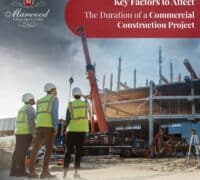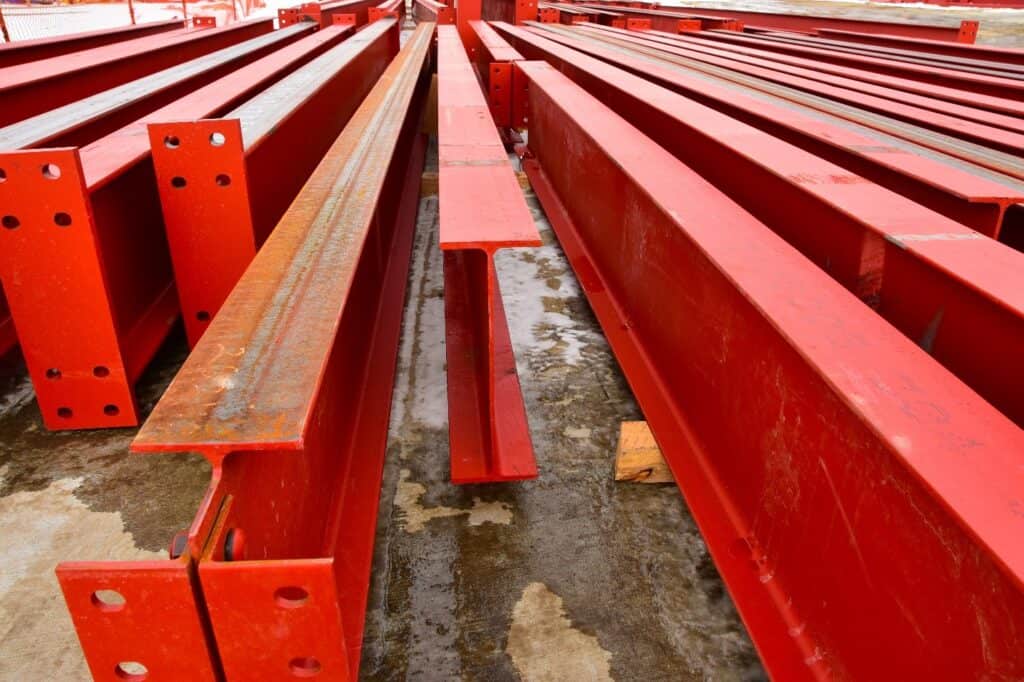
Executing commercial construction services is a complex and challenging professional service with many factors and experts at play. One relevant factor that is discussed when conceiving such a project is the time it will take to complete.
The time to be taken in initiating and completing the project is directly proportional to its size, scope, and complexity. For instance, based on the above-mentioned factors, some projects may take months to complete while some may take years.
Since the time of completion has a bearing on the overall cost of the project, it is important to know the overarching factors that can determine the timeline of any commercial construction services.
You may also read our resource to learn more about commercial remodeling, the process of selecting a commercial general contractor, or the design-build approach to adopt.
What factors impact the duration of any commercial construction?
Any commercial construction services, including commercial renovations and new building projects, can take a long time to complete depending on its scale, size, and complexity.
However, there are many commercial construction services factors to affect the timeline as mentioned below:
The Lending Process
Since any commercial construction services involve a large sum of money as an investment, many project owners or commercial construction companies take recourse to seek loans from banks or financial institutions.
However, getting a loan approved is no easy task as there are plenty of twists and turns along the way.
The person or company applying for the loan needs to submit a lot of information to the lender, including leases and revenue sources to make the debt service.
Further, if the loan seeker is known to the lender and has experience in the field, the approval can be relatively quickly.
However, if the project owner or company is doing this for the first time or has approached multiple lenders for financing the project, the lending process may get delayed by several months.
Underwriting a bridge loan requires construction plans, an executed contract with the commercial construction company, and permanent financing in place at the minimum.
They may require additional supporting documents as the loans go through the committee.
Obtaining Permits
Getting a slew of permits for any commercial construction services project can be a tough task as the process can vary based on the location of the project site.
For instance, a county or city with zero or less backlog for permits can review the blueprints or building plans and give the permit quickly provided everything is aligned to the building codes applicable in that area.
On the other hand, a county or city with a huge backlog can make things difficult to obtain a permit in a short time.
In fact, the permitting process in such places can take months thereby delaying the commercial contracting project.
The requirements for new commercial construction are greater and the process often involves planning & zoning as well as the public works department.
In the City of Houston Planning Dept may conduct impact studies on the need for additional fire department resources or expanding the right of way. This can cause substantial delays in the approval process.
Thus, taking far more time than a commercial renovation permit application to the building department.
Weather
Weather elements have a major say in determining the course of any commercial construction services project.
This is due to the fact that many types of construction activities cannot be done in scenarios like pouring rain, gushing winds, freezing temperatures, or heavy snowfall.
These scenarios can simply be termed as the non-elective changes imposed on commercial contracting projects where the owner or other stakeholders like contractors, subcontractors, and labor cannot do much except wait for the weather phenomenon to pass.
Weather usually has the greatest negative impact on the early phases of the building schedule.
Commercial builders usually put a force majeure clause to countenance the disruptions caused by Mother Nature.
Change in Project Scope
The scope of work for any commercial construction services project is about the deliverables or outcomes to be expected at the time of completion.
Since most of the project aspects, namely, schedule, estimation, and procurement are calculated from the initial scope, any change therein can result in delays and additional costs.
The change in project scope can be due to a variety of reasons, which may include poor scope definition, issues in project funding, not considering the associated risks and uncertainties, and a change in design, among others.
So, any change in the project scope can result in the revision of aspects such as budget, timelines, procurement plan, construction methodologies, quality assurance, etc.
In other words, a delay in the building schedule vis-a-vis the initial baseline is inevitable. The question is normally the magnitude of the changes.
The Subcontractors
The experience and expertise of the subcontractors are important factors that can have a bearing on the duration of the building contracting process.
If the subcontractors stick to their crew size and committed schedule and do not delay or slow down the work, the project can reach its completion stage as agreed.
However, if the subcontractors reduce their crew size, do not know their job well, and need to be guided at every turn, the delay will be a foregone conclusion.
Hence, it is important to hire the right commercial builders and subcontractors for the project (read with sufficient experience and expertise).
Also, it is important that the commercial general contractor manage the subcontractor’s work to ensure they complete the planned construction activity timely and within the quality specifications.
You may read our blog to know the reasons causing construction delays and the ways to mitigate them.
Poor Construction Management
Any building contracting project needs proper management on a daily basis to get completed safely within the scheduled time and meet the quality standards defined by the building documents.
However, if the building contractor lacks experience and expertise, there can be delays on account of scheduling gaps with subcontractors.
Also, if the contractor is busy with other projects and does not have the time to monitor your project, the subcontractor’s crew working on the project can lose sight of quality standards for the sake of speed and prolong the schedule.
So, to mitigate such poor project management of new commercial buildings or remodeling, knowledgeable and experienced commercial builders should be hired in the first place.
Selecting the right commercial construction companies to interview and hire is critical to the success of a contracting job. To learn more about the differences in general contractors please click construction companies near me.
Flaws in Design
The contracting plan and other documents can have design flaws, which when identified at a later stage before or after construction, can lengthen the time of the building process.
For instance, the architect or designer preparing the initial blueprint may not have taken into account the correct dimensions or certain aspects of flooring or roofing while designing.
But if these are detected after design, especially when significant contracting activity has already been executed, the remedy would be to remove portions of the building and rebuild them. These types of errors will delay the timelines or duration of the project.
It goes without saying that hiring a good building contractor would help minimize such oversights of design flaws in the blueprint during design or at least contribute considerably to a creative workaround solution.
Change Orders
It is not always the case that all commercial construction projects go according to the plan without hiccups, for there can be unforeseen changes that may present themselves during the planning stage as well as discretionary change requests.
These may include adding a sudden project requirement based on the owner’s preference such as floor plan modification, electrical layout change, etc.
At the same time, the commercial general contractor may suggest changes to optimize cost and schedule, which if agreed upon by the project owner, can affect the duration of the project.
Additionally, to know the role of a commercial general contractor in executing a building contracting project, view our video.
Inappropriate Project Schedule
A proper scheduling plan shows the sequential order in which the contracting activity is to be executed and monitored.
Thus, scheduling entails the application of technical knowledge and understanding of the logical relation between resources and activities to be carried out.
If the scheduling is improper, then precious resources get diverted for activities that are not critical, thereby resulting in delays.
To mitigate such problems, the commercial contractor should have the experience and expertise to understand the scope of the project and plan the entire renovation or new building activity effectively.
He or she should have better knowledge of sundry aspects such as bill of quantities, knowledge of contracts & insurance, construction safety, engineering drawings, and estimates, project scope, client requirements, and the nature of work.
Conclusion
The very nature and dynamics of commercial construction can prolong the duration of the project. The above-mentioned factors notwithstanding, it is advisable to hire the best contractors to deliver the goods.
This is due to the fact that a knowledgeable and experienced commercial general contractor shall stick to the plan, hire the right subcontractors, procure the materials in advance, communicate with the project owner and keep him or her updated, arrange permits and inspections, and monitor the entire process.
You may further read a blog to learn about the factors that can affect the length of a contracting project and make sure these factors are taken into account while drawing a construction plan.













